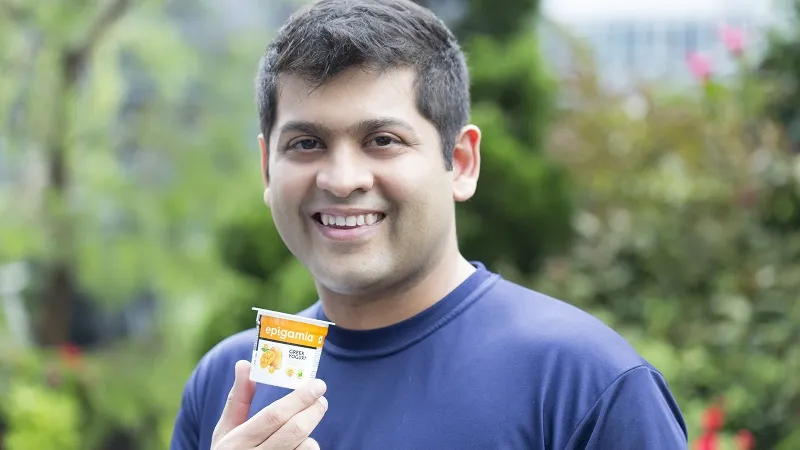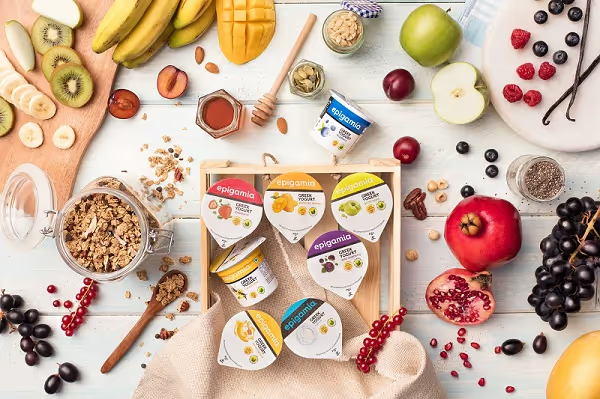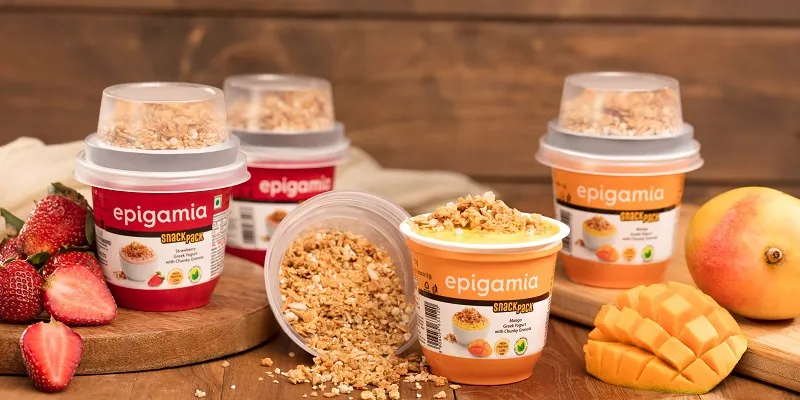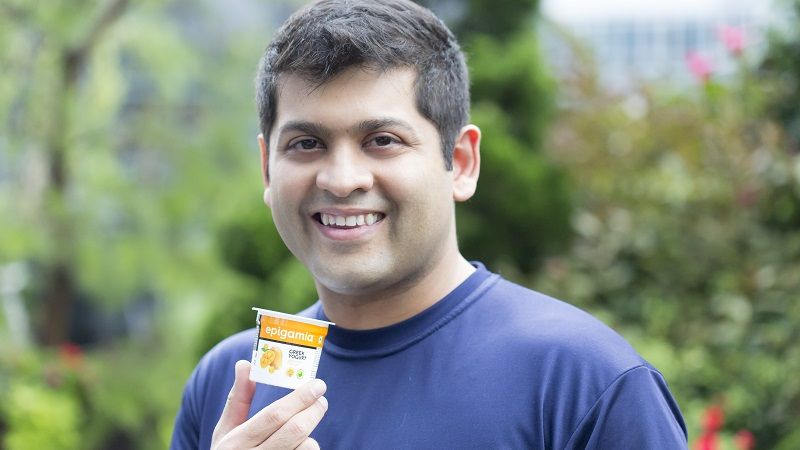With sales of 3 million units a month, Epigamia shows how a new-age FMCG brand can hook consumers in India
Mumbai-based startup Drums Food International has tasted success with its Greek yogurt brand, Epigamia, which retails through over 8,000 distribution points in five top cities.
How did an NRI with degrees in finance and management from NYU’s Stern School of Business and an MBA from the Wharton School end up selling Greek yogurt in India?
Rohan Mirchandani, the NRI in question, chalks it all down to serendipity.
Today his venture, Drums Food International, sells the Epigamia brand of yogurt through 8,000 modern trade and kirana outlets in five cities—Bengaluru, Hyderabad, Chennai, Delhi and Mumbai—apart from online stores like Amazon and BigBasket. The company sells around three million cups of yogurt a month with the 90gm packs priced at Rs 36 and Rs 40, depending on the flavour.
But it wasn’t a straight-forward journey to entrepreneurial success for Rohan and Drums.
Before joining his MBA course, Rohan, who grew up in New Jersey, travelled to India in 2009 to meet family and explore opportunities in the tech space. He met Chef Ganesh Krishnamoorthy, who had started a hobby ice cream business. Intrigued by the concept, Rohan, a self-proclaimed foodie, decided to make a passion investment into the venture.

He went back to the US and joined the Wharton School the next year with the intention of pursuing a career in finance. In December 2011, Rohan spent a week in Mumbai for a course on marketing to the Indian consumer.
“That was my ghanti baj gayi moment, the Eureka moment,” recalls Rohan, 35. He realised he wanted to be a food entrepreneur in India, and started making plans for the ice cream venture, Hokey Pokey.
During the course of the week-long programme he met Shripad Nadkarni, former head of marketing at Coca Cola and Founder of marketing consulting firm MarketGate that was acquired by Publicis Groupe.
Starting a food brand
Rohan’s idea was to build ice cream parlours around the country, but Shripad suggested the FMCG route. “He said he would invest in the company and mentor me, but I had to move to India. I could not be a non-resident entrepreneur,” Rohan says. That’s how in January 2013 at the age of 30, a freshly graduated Rohan moved to India.
He convinced Ganesh to come on board full time and started building the FMCG plan for Hokey Pokey, with the ice creams hitting stores in 2014.
“While we started with ice cream, the idea was always to expand to other products,” Rohan says.
Within months of launching the ice creams, the team realised that there were limitations to the product. Ice cream, after all, is extremely seasonal, with sales plummeting during the monsoon and winter months.
There were other learnings too.
For the Indian consumer the bar was can I make this easily at home? If the answer to that is no then he is willing to pay a premium,” Rohan says.
The team also realised that while the Indian palate is defined (even McDonalds had to famously Indianise its menu), consumers are willing to experiment within that (hence the success of a McAloo tikka burger). The other learning was that the market was moving towards healthy products and that fresh was equated with health.
Complementary to mainstay
With these learnings, the company launched Greek yogurt brand Epigamia in 2015 as a complementary product to ice cream.
At that time Hokey Pokey was doing fairly well, with around 1,200 outlets selling about 50,000 litres of ice cream a month. Rohan says business was good, but it was not growing fast.
Epigamia, however, proved to be a sleeper hit. While it was launched as a complementary product, the team soon realised that the brand could become larger than Hokey Pokey. The brand saw sales of 10,000 cups in the first month of launch.
The company launched with plain, mango, and strawberry flavours, with all ingredients sourced locally. For instance, the mangoes come from Ratnagiri, while the strawberries come from Panchgani. The product is preservative free.

The cold chain challenge
The team had tried distributing through third-party distributors for Hokey Pokey, but realised that the cold chain network in India was broken. Especially for products like theirs with a short shelf life. Since Epigamia’s shelf life is 15 days, the team realised they would have to do distribution on their own.
Just before the launch of Epigamia, Drums got Rahul Jain on board as Founding Partner and COO. Rahul had created an innovative cold chain-based home delivery business model while studying at ISB. He had started home delivery of fresh organic milk in Mumbai in 2013, and had scaled it up to 5,000 homes by 2015.
Drums replicated that model. The company now has 100 cold chain trucks, with each covering around 25 to 30 stores every day. Sales staff accompany each truck to ensure that the products are placed in the correct refrigerated shelves.
The company raised two rounds of funding—the latest a Series B round of about $14 million in 2017—primarily for technology, manufacturing, developing the cold chain, and hiring.
Rohan says getting placement on modern trade shelves was easy. Modern trade outlets are looking for innovative products and once they saw high sales at a few outlets, it was easy to get space at other supermarkets.
Kirana stores, however, were a completely different ball game.
Rohan visited hundreds of stores personally to get space for the products and, more importantly, to put up sampling counters. He then started reaching out to city-based retailer associations to get access to multiple kirana stores.
“Kirana stores are the more profitable part of our business. Modern trade is still niche in our country, with only about 4,000 to 5,000 stores, while there are over nine lakh stores overall,” Rohan says. Kirana stores contribute about 35 percent of the company’s business, while online sites contribute 10 percent. This mix could change when Epigamia expands beyond the top cities.
The company decided to stop retailing Hokey Pokey a few months back and will focus only on Epigamia, though Rohan says the company will relaunch the ice cream brand in the future.
Ice cream requires a frozen supply chain, while yogurt needs a cold supply chain. Having two distinct supply chain systems was not viable for now.

Scaling up
Food and grocery is expected to account for 66 percent of the $1.1 trillion Indian retail market in 2020. So the market is large. A number of young food brands have launched in recent years, lured by this large market and taking advantage of new technologies and improved logistics.
Catamaran Ventures-backed ethnic drinks brand Paper Boat and ready-to-cook brand ID Foods are two of the more successful brands that have come up in the past decade.
No wonder then that Rohan is bullish about the prospects of his company.
So far, the company has used contract manufacturers. It will soon set up a manufacturing facility in the South, a region that contributes 55 percent of overall business.
Drums is also set to expand distribution to Pune and Ahmedabad.
Further product launches are also on the cards. Products that can make use of the same cold chain supply chain are being developed. “The idea is to sweat the same asset,” says Rohan, whose company has an employee base of 225.
The next product launch, around six months away, will be packaged lassi.
The company is targeting to be in over 15 cities by the end of next fiscal, and reach 40,000 stores in three years.
We want to bring a contemporary, modern-day twist to Indian food. Our products will always be Indian in DNA but can stand up to any global product,” Rohan concludes.











